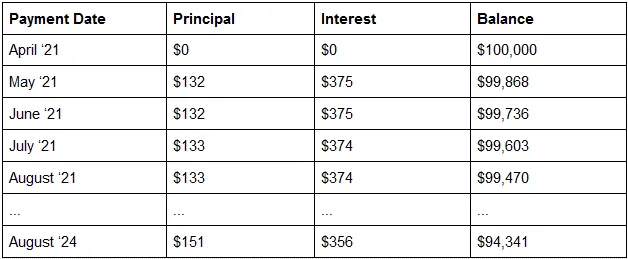Mortgage Amortization
The term mortgage amortization is the steady switch occurring to each mortgage payment between how much interest is covered and how much principal each month. Simply put, mortgage amortization is the plan for repaying a mortgage. Because the debt diminishes with each payment, the interest diminishes, and because the interest decreases monthly, the principal coverage increases with each payment.
The Mortgage Amortization Definition
Amortization is the way through which mortgages are repaid. This feature can be applied to mortgages with an equal monthly payment and a fixed timeline. Mortgages, as well as other loans, can be amortized.
Let’s see this through a more practical explanation. The trademark of an amortized mortgage or amortized loan is the shift from paying mostly interest every month to mainly paying principal every month. The math goes like this: for a $100,000 mortgage with a 4.5% interest rate, amortized over a span of 30 years, the fixed monthly payment totals at $507. In this value, during the first month, we will see that $375 goes to cover the interest, and the remaining $132 covers the principle. Towards the mortgage’s mid-term, there is a switch with $249 going to the interest and $257 to the principle. The last mortgage payment will be split into $2 for the interest and $505 for the principal.
How does Mortgage Amortization work?
Mortgage amortization is a repayment plan that uses an amortization table or amortization schedule as a way to visualize the concept. An amortization schedule is a grid or table showing how payments are split between the interest and the principal, and the balance that remains after each payment. Below you can see how mortgage amortization works in time.

With mortgage amortization, after four payments, the balance reaches $99,470, and in 3 years, the balance is $94,341. An amortized mortgage is a loan where the balance decreases gradually at first and more abruptly in the final years. Similarly, equity is built slowly at first but more rapidly in the last years.
Popular Real Estate Terms
An abstractor, or, most commonly known as an abstractor of title, is the individual that determines based on thorough research the condensed history needed for an abstract of title. They ...
Same as term insured loan: A loan indemnified against default by the borrower. Such loans may be a mortgage loan insured by a standard mortgage insurance policy or by FHA mortgage ...
Agequake is not the era of earthquakes! It’s a term that was coined by author Paul Wallace in his 1999 book “Agequake: Ridding the demographic rollercoaster shaking business, ...
Current value of a future sum or stream-annuity or mixed-of dollars discounted at a given rate. Present value determination is the inverse of future value calculation. ...
Charter issued by The Office of Thrift Supervision, under the U.S. Department of Treasure, to an institution to act as a savings and loan association. A federally chartered savings and loan ...
When two or more individuals simultaneously have rights in a property unit (e.g., apartment),. The individuals sharing the property have legal privileges and responsibilities to each other. ...
Individually owned lots and houses with community ownership of common areas. ...
Selling lots of land for such reasons as building structure on them including homes, office buildings, and shopping centers. ...
Transfer of personal property via a will as a gift to the recipient. ...

Have a question or comment?
We're here to help.